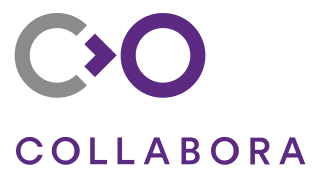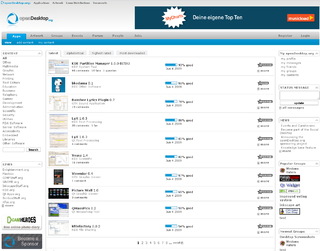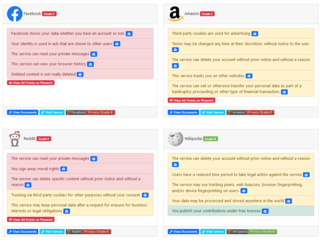Calendaring Extensions to WebDAV, or CalDAV, is an Internet standard allowing a client to access and manage calendar data along with the ability to schedule meetings with users on the same or on remote servers. It lets multiple users in different locations share, search and synchronize calendar data. It extends the WebDAV specification and uses the iCalendar format for the calendar data. The access protocol is defined by RFC 4791. Extensions to CalDAV for scheduling are standardized as RFC 6638. The protocol is used by many important open-source applications.

Collabora is a global private company headquartered in Cambridge, United Kingdom, with offices in Cambridge and Montreal. It provides open-source consultancy, training and products to companies.

openDesktop.org is a libre website portal offering personal cloud services like storage and communication services, as well as public services in form of a store for libre content publishing and a code hosting site for open development.

OpenStack is a free, open standard cloud computing platform. It is mostly deployed as infrastructure-as-a-service (IaaS) in both public and private clouds where virtual servers and other resources are made available to users. The software platform consists of interrelated components that control diverse, multi-vendor hardware pools of processing, storage, and networking resources throughout a data center. Users manage it either through a web-based dashboard, through command-line tools, or through RESTful web services.

LibreOffice is a free and open-source office productivity software suite, a project of The Document Foundation (TDF). It was forked in 2010 from OpenOffice.org, an open-sourced version of the earlier StarOffice. The LibreOffice suite consists of programs for word processing, creating and editing of spreadsheets, slideshows, diagrams and drawings, working with databases, and composing mathematical formulae. It is available in 115 languages. TDF does not provide support for LibreOffice, but enterprise-focused editions are available from companies in the ecosystem.

The open-core model is a business model for the monetization of commercially produced open-source software. Coined by Andrew Lampitt in 2008, the open-core model primarily involves offering a "core" or feature-limited version of a software product as free and open-source software, while offering "commercial" versions or add-ons as proprietary software.

Frank Karlitschek is a German open source software developer living in Stuttgart, Germany.

ownCloud is an open-source software product for sharing and syncing of files in distributed and federated enterprise scenarios. It allows companies and remote end-users to organize their documents on servers, computers and mobile devices and work with them collaboratively, while keeping a centrally organized and synchronized state. ownCloud supports extensions like online document editing, calendar and contact synchronization. Users can work with documents from a browser, and there are clients for a variety of operating systems as well as mobile clients for Android and iPhone.

PDF.js is a JavaScript library that renders Portable Document Format (PDF) files using the web standards-compliant HTML5 Canvas. The project is led by the Mozilla Corporation after Andreas Gal launched it in 2011.

Terms of Service; Didn't Read (ToS;DR) is a community project which aims to analyze and grade the terms of service (TOS) and privacy policies of major Internet sites and services. Each aspect of a TOS or privacy policy is assessed as positive, negative, or neutral. Services are graded from A (best) to E (worst) once a comprehensive list of cases has been reviewed by volunteer curators. The name of the project is a play on the phrase too long; didn't read.

Seafile is an open-source, cross-platform file-hosting software system. Files are stored on a central server and can be synchronized with personal computers and mobile devices through apps. Files on the Seafile server can also be accessed directly via the server's web interface. Seafile's functionality is similar to other popular file hosting services such as Dropbox and Google Drive. The primary difference between Seafile and Dropbox/Google Drive is that Seafile is a self-hosted file sharing solution for private cloud applications. In private clouds, storage space and client connection limits are determined exclusively by the users' own infrastructure and settings rather than the terms and conditions of a cloud service provider. Additionally, organizations, whose data privacy policies bar them from using public cloud services can draw on Seafile to build a file sharing system of their own.

Nextcloud is a suite of client-server software for creating and using file hosting services. Nextcloud provides functionality similar to Dropbox, Office 365 or Google Drive when used with integrated office suites Collabora Online or OnlyOffice. It can be hosted in the cloud or on-premises. It is scalable from home office software based on the low cost Raspberry Pi all the way through to full sized data centers that support millions of users. Translations in 60 languages exist for web interface and client applications.
Kopano is an open-source groupware application suite originally based on Zarafa. The initial version of Kopano Core (KC) was forked from the then-current release of Zarafa Collaboration Platform, and superseded ZCP in terms of lineage as ZCP switched to maintenance mode with patches flowing from KC. Kopano WebApp similarly descended from Zarafa WebApp. Since October 2017, Kopano Core is also known more specifically as Kopano Groupware Core, since Kopano B.V. developed more products that were not directly requiring groupware components.
This is a list of articles related to the JavaScript programming language.

ActivityPub is an open, decentralized social networking protocol based on Pump.io's ActivityPump protocol. It provides a client/server API for creating, updating, and deleting content, as well as a federated server-to-server API for delivering notifications and content.
Self-hosting is the practice of running and maintaining a website or service using a private web server, instead of using a service outside of someone's own control. Self-hosting allows users to have more control over their data, privacy, and computing infrastructure, as well as potentially saving costs and improving skills.

KeeWeb is a free and open-source password manager compatible with KeePass, available as a web version and desktop apps. The underlying file format is KDBX.

Collabora Online is an open source online office suite built on LibreOffice Technology, enabling Web based collaborative real-time editing of word processing documents, spreadsheets, presentations, and vector graphics. Optional apps are available for desktops, laptops, tablets, smartphones and Chromebooks.














